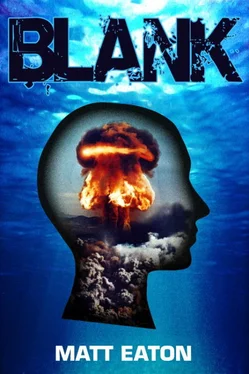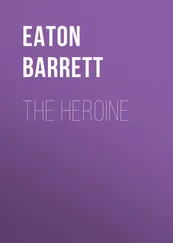Matt Eaton - Blank
Здесь есть возможность читать онлайн «Matt Eaton - Blank» весь текст электронной книги совершенно бесплатно (целиком полную версию без сокращений). В некоторых случаях можно слушать аудио, скачать через торрент в формате fb2 и присутствует краткое содержание. Год выпуска: 2015, ISBN: 2015, Издательство: Smashwords, Жанр: sf_postapocalyptic, на английском языке. Описание произведения, (предисловие) а так же отзывы посетителей доступны на портале библиотеки ЛибКат.
- Название:Blank
- Автор:
- Издательство:Smashwords
- Жанр:
- Год:2015
- ISBN:978-1-3110-4108-1
- Рейтинг книги:4 / 5. Голосов: 1
-
Избранное:Добавить в избранное
- Отзывы:
-
Ваша оценка:
- 80
- 1
- 2
- 3
- 4
- 5
Blank: краткое содержание, описание и аннотация
Предлагаем к чтению аннотацию, описание, краткое содержание или предисловие (зависит от того, что написал сам автор книги «Blank»). Если вы не нашли необходимую информацию о книге — напишите в комментариях, мы постараемся отыскать её.
Blank — читать онлайн бесплатно полную книгу (весь текст) целиком
Ниже представлен текст книги, разбитый по страницам. Система сохранения места последней прочитанной страницы, позволяет с удобством читать онлайн бесплатно книгу «Blank», без необходимости каждый раз заново искать на чём Вы остановились. Поставьте закладку, и сможете в любой момент перейти на страницу, на которой закончили чтение.
Интервал:
Закладка:
Luckman scanned the books on the shelves. He skimmed past the rows of tedious Catholic commentaries, his eyes halting momentarily on a copy of Conversations With God – unusual, although not entirely out of place. There was an iterative shelf of Bibles new and old – one or two of them several hundred years old. On another shelf he spotted The Bible Code among rows of fantasy and science fiction novels – Father Paulson had apparently been a particular fan of Robert Heinlein and Stephen Donaldson. But one book in the sci-fi section seemed distinctly out of place. The familiar white leather binding of The Keys of Enoch caught Luckman’s eye immediately.
He only knew of the book’s existence because Seamus had been waving it around for years as a work of genius. Depending on who you believed, it was either divine inspiration or grand self-delusion. The author’s intention had been to provide a book of bold and elusive insights on life, the universe and everything. But the text had no place at all in the home of a Catholic priest. It told Luckman that Father Paulson was no ordinary cleric. To say nothing of his personal assistant’s powers of illusion.
He pulled The Keys off the shelf to confirm it was the same book. Sure enough, it was published by The Academy For Future Science, written (or channeled) by J.J. Hurtak in 1973. The leather-bound hard cover was emblazoned with the golden flaming letters YHWH . Inside were those familiar, but frustratingly impenetrable, “revelations”.
Luckman let the book fall open and found himself reading Key 1-1-4: “We are part of a larger vehicle which evolves into the next order of evolution in a pillar of light which establishes a light zone where life within cannot be absorbed into the ‘destructive anti-universe’.”
Luckman didn’t have a clue what that meant.
Had Paulson known?
He heard footsteps and quickly slid the book back into its slot on the shelf just in time to avoid awkward questions.
“No sign of anyone else,” Pollock informed him. Daisy was beside him. He was holding her by the arm.
“You sure you saw someone?”
“Pretty sure,” Luckman replied honestly, although he was beginning to doubt himself. “Daisy, who is this woman pictured with the Father?”
She looked embarrassed. “They pretended she was just his housekeeper, but she was really his wife.”
Luckman’s eyes widened in surprise.
“Oedipus complex,” Paulson grunted. “S’pose we should be grateful he wasn’t diddling young boys.”
“She doesn’t live here?” Luckman asked Daisy.
“Jean died about 10 years ago. I never met her.”
“Wonder what the Pope would have had to say about that?” said Pollock. “Righto Captain Luckman, I’m ready when you are. Daisy here is coming back to the station for a bit more of a chat.”
Twenty-Eight
Paolo Favaloro was waiting for him at the same table when Luckman returned to the café.
“Hello Captain Luckman.”
He held out his hand and Luckman shook it. “I apologise for my disappearance at Father Paulson’s house but I do not care to reveal myself to the local police.”
The response struck Luckman as disingenuous. “I’d have thought helping the police would be to your advantage. Unless you have something to hide.”
“I am, of course, very concerned about the padre’s death. But, as you may have gathered by now, there is nothing the police can do to help. They cannot begin to understand. I fear most men in authority would mishandle matters such as this because they cannot admit there is a limit to their own competence.”
“I’m interested in this disappearing act of yours. Care to explain?”
Favaloro smiled. “Trust me when I tell you this is not important.”
Luckman recognised a deathly darkness in Favaloro’s gaze, a look he had seen before in the eyes of men who had killed not just for survival but for a cause. “Who are you? What have you and Paulson been doing out here?”
“I was his technical advisor.”
“That tells me less than nothing.”
Favaloro smiled wistfully. “I understand you have many questions. I came to tell you that many of the answers you seek are in Father Paulson’s study. There is a key under a pot plant near the back door – and another more important key in the study. Night time is best. Everyone in this town is asleep by 10 o’clock.”
Favaloro shifted his gaze toward something over Luckman’s shoulder. “I’m sorry but you must excuse me.” He flickered and evaporated like a holographic projection.
Luckman turned around. There was no-one behind him. Whatever caught Favaloro’s eye wasn’t in the café. Luckman sighed and rubbed his hand wearily through his hair. For the second time, the Italian’s vanishing act raised more questions than the man himself had answered. But they had shaken hands. He had felt the warmth of the Italian’s firm grip, and noted the thickness and length of his fingers. Favaloro was no Doobie Brother – he was flesh and blood.
Luckman arrived back at the motel around half past three in the afternoon and immediately felt the onset of an almost irresistible torpor. He had to consciously restrain himself from giving in to the urge to lie down. Mel arrived at the door of his room, dripping wet and wrapped in a towel.
“Eddie’s already passed out next door. That pool’s like a bath but it’s woken me up. You should do the same.”
“We should wake him,” said Luckman.
“I tried. He’s gone for all money. We could throw him in the pool but he’d probably drown.”
“I’m fairly certain whoever is doing all this is getting at people while they’re asleep,” he said.
“You mean like Freddie Krueger?”
“Something like that.” There was a nagging sense of panic in his guts that this mission was already doomed to failure.
“How’d you go with your inquiries?” he asked.
“I found another local Catholic priest. Just so you know, I might have left him with the impression that I was a plain-clothes detective. He said he knew Father Paulson. Very upset to hear he’d been killed. Had nothing but kind words for the man. I did pick up thoughts of travel. When I asked, he said he thought Paulson had been some sort of liaison for the Vatican Bank.”
“That’s got to be a cover story,” Luckman told her.
“Why? Who do you think he really is?”
“I don’t know yet.”
“So tell me about the rest of your day.”
“I’ve just been back at that café to meet my disappearing man for a second time.”
“You are not crazy,” she assured him. “You’re one of the most mentally focused people I’ve ever met.” She sat down on the edge of the bed. “Tell me something – ever heard of the normalcy bias?”
He shook his head. “Where do you get this stuff?”
“I’m not just an ace news camera operator you know. I was about to complete a Masters in Philosophy before the shit hit the fan. The normalcy bias is a mental state that affects how people react to disasters. It’s the expectation that because life has been safe and predictable, it’ll remain that way forever. It’s why people underestimate the risk of catastrophes, and it’s why they can’t cope afterwards.”
“That’s philosophy?”
“No that’s psychology. Just be quiet and listen for a moment. They say normalcy bias was why so many Jews failed to flee Hitler’s Germany before it was too late. Too many were convinced something like the Holocaust could never happen.”
“You think we’re seeing that type of reaction here.”
“No doubt, although its effects are being magnified by some external source. Something that plays upon the self-delusional aspects of cognitive dissonance.”
Читать дальшеИнтервал:
Закладка:
Похожие книги на «Blank»
Представляем Вашему вниманию похожие книги на «Blank» списком для выбора. Мы отобрали схожую по названию и смыслу литературу в надежде предоставить читателям больше вариантов отыскать новые, интересные, ещё непрочитанные произведения.
Обсуждение, отзывы о книге «Blank» и просто собственные мнения читателей. Оставьте ваши комментарии, напишите, что Вы думаете о произведении, его смысле или главных героях. Укажите что конкретно понравилось, а что нет, и почему Вы так считаете.












